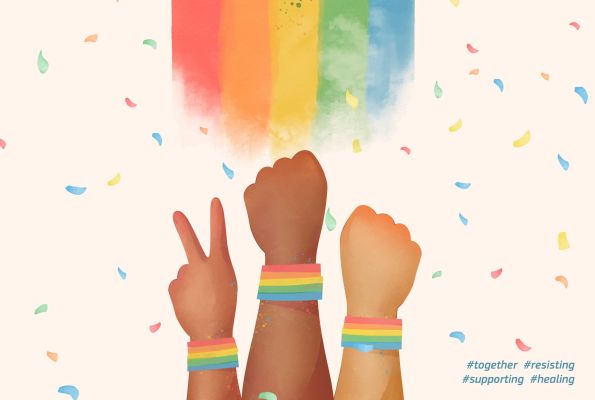Pandemics and LGBTQ(I) Community

May 17 is the international day against homophobia, transphobia, and biphobia. The pandemic has severely affected LGBTQ(I) community the majority of whom worked in service sector. As a result of the pandemic induced regulations clubs have remained closed while eateries, such as cafes and restaurants, which were also closed, now operate under restrictions. That is why members of the LGBTQ(I) community report that the majority of this community have lost their jobs.
Julia, 37, a transgender woman is one of those who have lost their jobs due to the pandemics. “Before the pandemics, I worked in a gay club. My job was to keep order and do drag shows – dances. I have been unemployed since the last year when everything was shut down. People would help me out. Then I applied to the Equality Movement and they have supported me with food vouchers and rent payment. [They also] funded vocational training in culinary. But now everything is closed and I have not been able to find a job. I have poor health and I find it difficult to do work physically. I have also been a victim of bullying. I do not feel safe when I go out in the street”, – says Julia.
Nikoloz, 26 a highly paid sales manager, was left without the job when sales went down as a result of the pandemics. Finding the job was easier for him, as unlike transgenders, his orientation was not much visible for strangers.
“I have been living independently since I was 18 and finding myself in a difficult situation has been hard on me. It is embarrassing to ask your parents for money after all these years. Then I found a consultant’s job in a shop. In addition to a difficult work schedule, the pay was rather low. The conditions were difficult. When the public transport stopped, I had to walk a long distance to my workplace. I had to quit. I decided to leave the country. There is no freedom here. Even patrol police are homophobic. I do not want to be constantly hiding. I want my family to know I belong to this community, but I can’t tell them – my family is rather traditional and they will not be able to understand me. I have nothing to stop me from leaving. This country has made me tired. I have tried to do a lot of stuff: I used to run my NGO. I would visit schools and explain to children what tolerance and liberalism stand for, that we should not fight over religious, cultural and ethnic belonging. I have always stood next to common sense, but when May 17 came, nobody stood next to us”, – says Nikoloz, heartbroken.
Members of LGBTQ(I) community are often denied employment on homophobic ground and therefore they are forced to work as commercial sex workers. However, those members of the community who previously worked as sex workers, are now unable to go out to the street because of 9 PM curfew and therefore, they have lost this source of income as well.
A transgender woman named Gabriella, 30, is a former commercial sex worker who now works as a nurse aide in one of healthcare facilities. At the same time, Gabriella has been trained as a qualified nurse.
“First I started as a nurse aide. Then I got interested and the Equality Movement agreed to fund nurse training for a year. I really like the working environment. Now I am working in a Covid ward. There are six other members of the LGBTQ(I) community who have been given jobs in the clinic. The team is excellent. I have good relationship with patients as well. I wish other facilities follow the example of this clinic”.
The Equality Movement has been called home by members of Georgia’s LGBTQ(I) community for as long as 10 years. According to Davit Kakhaberi, an executive director of the organization, before the pandemics they focused on ensuring the access to social and medical services to the LGBTQ(I) community. The other areas of the organisation’s work included community mobilization, support to vocational development and advocacy for their rights.
“2020 was loaded with challenges and we had to modify all our activities. We are not a humanitarian organization and therefore had no relevant experience. However, as early as February 2020, members of the community already had a whole range of needs and they did not know who to go to. They would come to us since, sadly, the state had failed to respond to their challenges. The role of the EU is that we help the community members with vouchers and rent payment. In addition, there is a mental health and social support components supported by the project. We did not expect needs to grow but there has been a consistent rise”, says Davit Kakhaberi, executive director of the organization.
Julia, Nikoloz and Gabriela like other members of the LGBTQ(I) community are the beneficiaries of the Equality Movement project supported by the EU. The project took off in March 2021 and has already helped 246 members of the LGBTQ(I) community with food vouchers, 134 more with rent payment while 16 beneficiaries have been given medical assistance. 27 members of the LGBTQ(I) community have received consultations from a psychologist while 256 of them have been supported by a social worker.
It is important to note that, thanks to the EU’s financial support, for the first time, services stipulated by the project will be extended to beneficiaries residing in Georgian cities of Kutaisi, Batumi, and Zugdidi.